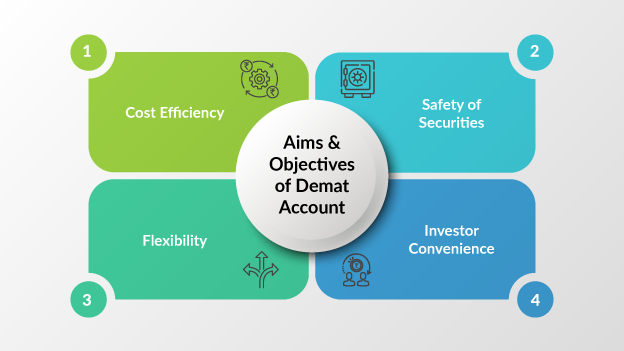The Dematerialization Concept
Dematerialization was established in India by the Depositories Act. There are two depositories in India which are, Central Depository Services Limited and National Securities Depository Limited. The main motive of the Depositories Act was to make the transferability of securities safe and because of the conversion of physical certificates into an electronic form, trading in securities is now more convenient. Depository participants provide access to a demat account and other depository services to investors or institutions such as banks, stockbrokers are eligible to act as DP.
Process:
- You need to open a Demat account to dematerialize your securities through a depository participant and submit documents to the DP. Post-verification, the DP will open a Demat account in your name.
- The next step is to fill a dematerialization request form and submit it with the physical certificates to the DP.
- If no discrepancies are found, the registrar will forward the request to NSDL or CDSL. The choice of depository depends on which depository the DP is registered with.
- Post-completion, the depository credits your Demat account with an equal number of shares. The dematerialization process takes 30 days.
Specific instances of the rejection of the dematerialization request:
- Transmission cum Demat: This is when you jointly hold securities and one of the joint holders has passed away. To dematerialize the shares, you will have to submit the share certificate, the death certificate and the transmission cum Demat form to the DP.
- Transposition cum Demat: This form has to be submitted to the DP if the names on the Demat account do not match with the names on the physical certificates.
Re-materialization:
Re-materialization is the process where securities in electronic form are reconverted into physical form. To re-materialize, you have to submit a Remat Request Form to your DP. Post which, the DP blocks the securities and the form is then forwarded to the depository/registrar. Post-verification, the company/registrar prints out the physical certificate and sends it to the investor.
Aims & Objectives of Demat Account

1.Safety
Before Demat accounts, shares were in the physical form, which was susceptible to theft/forgery. Demat accounts prevent you from losing/misplacing securities.
2.Convenience
Earlier, if you had to transfer shares, you would have to send the shares to the registrar which would take months to complete. Now, the Demat account has made a quick transfer of securities a reality.
3.Cost Efficiency
When shares were traded in the physical form, you had to complete a lot of paperwork which would entail a lot of time cost. Now, it is very system-efficient and has reduced the cost of trading.
Another cost-benefit of demat accounts is that it made the stamp duty irrelevant. Trading in physical shares meant buying a share transfer stamp and sticking it to the bottom of the certificate. Sometimes, investors had to go to the stock exchange to get the share transfer stamp. Getting share transfer stamps was more difficult and costlier for investors from small towns. Demat account aims and objectives were to reduce the cost of trading and make it convenient for the investors and the elimination of stamp duty has helped in achieving the objective.
4.Flexibility
Earlier, there were a plethora of terms and conditions attached to investing. All the settlements were done manually which was troublesome. Now, it is easy to buy/sell any number of shares without any restrictions.
Demat Account is Mandatory for Trading in India
A Demat account is important for trading securities in India. However, it is just the front-end supported by a depository on the back-end. On the front-end, a transaction in the capital markets requires the transfer of securities from the buyer to the seller and at the back end, the transfer of securities from the holder to the depository takes place. The depositories maintain Demat accounts with unique numbers called ISIN for every client to ensure the safety of the transaction.
Benefits of Demat Account
- Demat accounts can help you get access to a variety of financing options. When you avail of a loan, the bank has to ensure the security of the collateral.
- Demat accounts have simplified the process of receiving benefits. If a company announces dividends, interest/refunds, the amount automatically shows in the Demat account.
- Demat accounts have made it convenient to have decent internet to access the capital markets while being anywhere.
- You don’t face limitations like buying/selling shares in fixed tranches. Thus, one can even do transactions for a single share too.
- A Demat account is accessible via multiple access points in real-time, viz. your smartphone, or desktop. You must choose an IIFL trading account if you are planning to invest. The IIFL Demat/trading account offers in-depth research analysis that helps you in building your investment portfolio.
Conclusion
Demat accounts have enabled access to everyone by simplifying the investing journey on our website or demat account app. It helps you trade seamlessly without any hassles. You can have both a trading account and a bank account but you should make an informed decision while choosing the trading account. It is advisable to choose a Demat-cum-trading account from a reputed brokerage firm.



